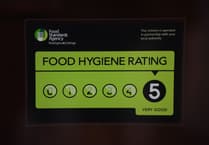More than two-thirds of the babies in Bath and North East Somerset were breastfed at least some of the time last year, new figures suggest.
It comes as the percentage across England rose to 56% – a record high.
The National Childbirth Trust said parents need better access to impartial advice and support, to help them make the best decisions for their newborns.
It comes ahead of Baby Week, a national event designed to raise awareness about the importance of early childhood and make the UK the best place to grow up in.
New figures from the Office for Health Improvement and Disparities show 69% of infants in Bath and North East Somerset were being breastfed at least some of the time, as of their six-to-eight-week health visitor review last year.
This was broadly in line with a year earlier.
Nationally, the prevalence of breastfeeding increased to 56% in 2024, from 53% in 2023. This was the highest figure reported since 2015, when records began.
Current Government advice is that infants should be exclusively breastfed, receiving only breastmilk for their first six months.
Louise Oliver, breastfeeding counsellor and head of inclusion and engagement at the NCT, said: "Almost half of women and birthing people in the UK end their breastfeeding journey before they want to.
"With only 1% exclusively breastfeeding at six months, the UK continues to have one of the lowest breastfeeding rates in the world."
The data shows 48% of the 1,473 infants in Bath and North East Somerset were totally breastfed, 21% were partially breastfed, and 29% were not breastfed at all.
Breastfeeding rates differed greatly across England, ranging from 32% in Blackpool to 83% in Windsor and Maidenhead.
Ms Oliver said: "We know that deprivation is linked to poorer outcomes for parents and babies, making effective feeding support even more important in these communities.
"We must actively listen to parents to understand how they can be better supported.
"When parents are supported to breastfeed or provide breastmilk for as long as they wish, it can help to improve health outcomes and reduce health inequalities."
Separate figures, also released this month, show the proportion of successful six-to-eight-week health visitor reviews across England also increased, from 82% to 85%.
In Bath and North East Somerset, health visitors attended to 89% of infants within this period, a decrease on the 91% in the previous year.
Catherine Hine, chief executive of the Breastfeeding Network, said the figures were "really encouraging".
"Progress like this shows that when families get good information and practical support early on, they can feed their babies in the way they want to," she added.
"The challenge now is to make sure every family who needs it can access independent, evidence-based support – regardless of where they live, their background, or their circumstances – and to ensure that parents get clear, accurate information free from commercial influence."
Kate Brintworth, chief midwifery officer for England, said: "It’s fantastic to see that more new mums than ever are being supported by the NHS to breastfeed their babies.
"As a midwife, I know that breastfeeding has lots of benefits for mums and babies.
"I also know that breastfeeding can take time to get the hang of, so I want to encourage all mums who want to breastfeed to speak to their midwives and health visitors for advice whenever they need it."
A Department of Health and Social Care spokesperson said the Government was "working to improve regional disparities on breastfeeding across the country".
They added: "We have extended the 24-hour National Breastfeeding Helpline and are investing £18.5 million in 2025-26 through the Family Hubs and Start for Life programme to improve infant feeding services and provide support with breastfeeding."
The NCT Infant Feeding Line provides inclusive and free to access feeding support to parents, every day from 8am to midnight, via 0300 330 0700.




